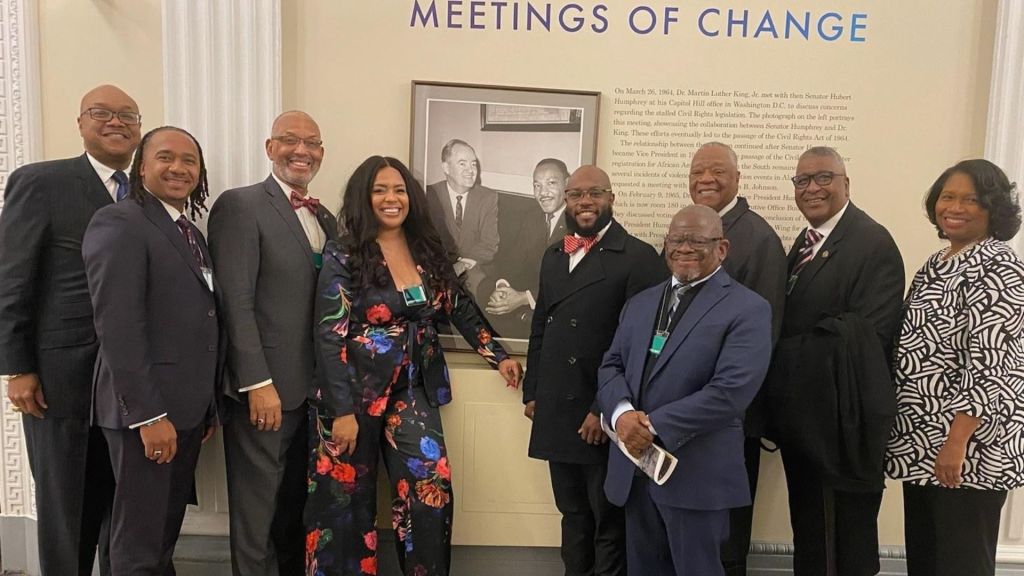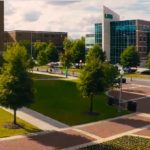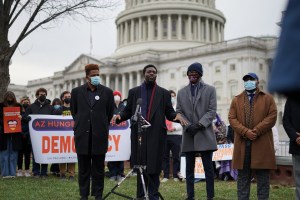By Tashi McQueen
AFRO Political Writer
tmcqueen@afro.com
The Biden-Harris Administration has made addressing climate change collaboratively a focus of their administration, which includes Black faith leaders.

Photo credit: Photo courtesy of Cassandra Carmichael/National Religious Partnership for the Environment
“The Federal Emergency Management Agency has been focused since the beginning of the Biden-Harris administration on helping to lead whole community climate resilience. What we recognize is that when communities are affected by disasters, unfortunately, Black communities have been disproportionately impacted,” Marcus T. Coleman, Jr., director of the Department of Homeland Security Center for Faith-Based and Neighborhood Partnerships (DHS Partnerships Center), told the AFRO. “What we wanted to do was create a series of engagements to bring together faith leaders, community leaders, non-government organizations and begin to be proactive about what we can do to help mitigate against the impacts of climate change.”
According to the McKinsey Institute for Black Economic Mobility, the results of climate change such as damaged property and increased health issues due to dangerous heat exposure or a lack of clean air and water, can significantly hinder the potential for Black socioeconomic mobility.
Black populations are also more vulnerable to physical hazards due to their concentration in areas more susceptible to extreme weather. Around half of all Black people in the U.S. reside in 11 southeastern states, which include Alabama, Louisiana, Maryland and Tennessee, where intense heat, hurricanes and flooding are particularly high.
“The roundtable that was hosted in June was one of several iterations of conversations we’ve been having again since 2021 and reflects our focus on making sure that before we have our next major disaster, we’ve built relationships with a broad array of partners,” said Coleman.
The roundtables and related meetings have been conducted by the Department of Human services and the Federal Emergency Management Agency (FEMA), gathering groups of non-profits, federal agencies and faith-based organizations under the White House’s National Climate Resilience Framework.
Objectives under the framework include equipping U.S. communities with the resources they need to determine climate risks develop solutions and help neighborhoods become more safe, equitable and resilient.
Dr. Leslie Copeland-Tune of the National Council of Churches is one of the partners who attended an April multi-faith leader climate resilience roundtable. Copeland Tune shared her experience at the meeting.
“It was really helpful to hear how FEMA and DHS negotiate responses to emergencies, and how they do the preparedness piece, and knowing the resources that are available to churches and faith-based communities for grants and other programmatic initiatives,” said Copeland-Tune. “You have a better idea of if you were an affected community, how you might engage with them to get the best response.”
One thing Copeland-Tune said that she believes could be improved is ensuring information on grants and resources is easily available to all churches throughout the U.S.
“Just dealing with what’s going on in their local congregation, it takes a lot of time and energy and effort,” she said. “It’s making it as easy as possible, as simple as possible, having connection points, those are the things that make the difference in ensuring churches get the resources that they need when they need them.”
Even so, Copeland-Tune says she’s experienced great communication from Coleman and Nicole C. Wood, deputy director of the DHS Partnerships Center, when she’s needed assistance.
The post How the Biden administration is working with Black churches to mitigate climate change appeared first on AFRO American Newspapers.











